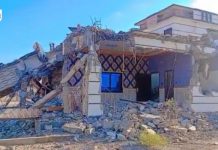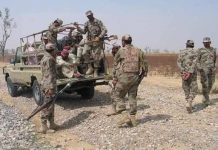Author: Zaarain Baloch
The quarrel over the controversial Pak-Afghan border morphed into an armed confrontation when the Pakistani border forces clashed with their Afghan counterparts twice in the last week. At least eight civilians were killed in the confrontation and multiple others were wounded, according to Pakistani officials.
Pakistani officials claim that the violence began on Sunday morning when the Pakistani border forces came under severe artillery shelling from the Afghan side. The ISPR, the Pakistani military’s media wing, said that at least seven people were killed while 16 others suffered critical injuries.
The ISPR further said that the Pakistani forces retaliated in kind, giving a “measured response” to the “unprovoked and indiscriminate” attack and “uncalled for aggression.” The ISPR said that Pakistani forces gave a “befitting” response and avoided targeting civilians on the other side.
Afghan officials in Kandahar say that one soldier was killed and 13 injured in the confrontation.
Pakistan’s Defense Minister Khawaja Asif said the Afghan government had apologized for the incident and that the “matter is now resolved.”
Pakistan’s Foreign Office condemned the incident, saying “such unfortunate incidents are not in keeping with the brotherly ties between the two countries.”
“The Afghan authorities have been informed that recurrence of such incidents must be avoided and strictest possible action must be taken against those responsible”, the Foreign Office said in a statement. It further said that authorities on both sides of the border were in close contact to prevent further escalation of the situation.
Perhaps the contact was not sufficient, because four days later, on Thursday, the forces on the two sides clashed once again. At least one person was killed and 12 others critically wounded in the latest confrontation.
The injured were immediately moved to the Chaman District Headquarters Hospital, where a state of emergency was declared.
Pakistani officials privy to inside information told media sources that the firing started from the Afghan side of the border.
However, the Afghan defence ministry accused Pakistani forces of initially the skirmish, stressing the need for peaceful dialogue to de-escalate the situation.
The busy border crossing at Chaman was closed for a few hours on Sunday before being reopened.
The border was also closed last month for a week after an armed man from the Afghan side opened fire on the Pakistani forces, killing one and wounding two others. That set off an intense exchange of fire between the two sides, leaving five Afghan personnel dead and 14 others wounded.
The border was reopened a week later on November 22 after a meeting between Pakistani border authorities and Taliban officials. However, the situation still remains volatile.
What is happening?
The controversial Pak-Afghan border has been a bone of contention between Islamabad and Kabul for decades. There was a perception that, following the Taliban takeover in Afghanistan in August last year, Pakistan may have finally achieved sought-after peace on the western border. But the frustratingly frequent bouts of cross-border violence have shattered these illusions.
A major cause of tension between Islamabad and Kabul is the Taliban’s objection to the fencing of the border. The Taliban challenged Pakistan’s right to fence the Durand Line area, which they do not accept as a legitimate border between the two countries. In fact, last week’s exchange of fire reportedly started when the Afghans tried to cut off parts of the border fencing.
Chaman, a busy transit trade route, has been the flashpoint of the cross-border confrontation, but clashes have erupted in other areas as well.
In order to formalize the border, the Pakistani authorities have put barriers at several points along the 2400-kilometre-long border. The Taliban have removed many such barriers. The Taliban argue that putting barriers restricts the movement of Pashtun tribesmen straddling both sides of the border.
Analysts argue that the Kabul administration is sheltering the Pakistani Taliban, which is involved in dismantling the demarcation. The TTP recently called off its ceasefire with Pakistan and stepped up cross-border attacks on Pakistani forces in the tribal areas. The group announced carrying out attacks throughout Pakistan.
The recent skirmishes come days after the attack on Pakistan’s envoy in Kabul. The incident carried the mark of the TTP, which is closely aligned with the Khorasan chapter of the Islamic State that claimed responsibility for the attack.
Pakistani Foreign Office claims it has received assurances from the Afghan Taliban that they won’t allow the TTP and other militant factions to use Afghan soil to carry out attacks against Pakistan.
Pakistan’s reorientation of Afghan policy
At a consultative dialogue in Islamabad on December 6, former generals diplomats, journalists and other security experts put their heads together to discuss the combustible situation between Pakistan and Afghanistan, made more flimsy following the TTP’s rescinding of the ceasefire with the state.
There was a wide consensus that reorientation and reformulation of Pakistan’s Afghan policy were required. Pakistan has played a key role in Afghan affairs over the past four decades, starting with the Soviet Invasion of 1979 where Islamabad jumped on the bandwagon with the Americans and the Saudis to bring down the USSR’s ‘evil empire.’
Experts argue that sometime during the Afghan jihad, Pakistan’s support for the Afghan Taliban morphed into ‘strategic depth’, a policy through which the Pakistani state, the military, in particular, sought to maintain a friendly regime in Kabul.
The Taliban regime was toppled following the 9/11 attacks, but Islamabad continued to support them, much to the chagrin of the USA. After a costly war spanning two decades, the USA had to hastily withdraw from Afghanistan, leaving a feeble regime that melted away as the Taliban got into striking distance of Kabul.
The Taliban, once again, rolled into power, and it seemed that Pakistan’s policy of ‘strategic depth’ was finally delivered. The Taliban were now the masters of their own fate, and Islamabad was looking towards Kabul with dreamy eyes.
But the recent border clashes show that the Afghan Taliban might be another persistent headache for Pakistan. The past few months have seen verbal sparring between officials of the two countries. Standing on what is arguably the most influential stage in the world – the UN General Assembly – Pakistani premier Shehbaz Sharif shared the international community’s concerns over the use of Afghan soil for terrorist activities, a comment that engendered an infuriated response from the Kabul regime.
The cross-border confrontations may have subsided, and the febrile situation calmed down for the time being. But it is unlikely that it would last for long. One way or the other, violence is bound to reappear, and the TTP’s marked presence in Afghanistan makes it a certainty.






























